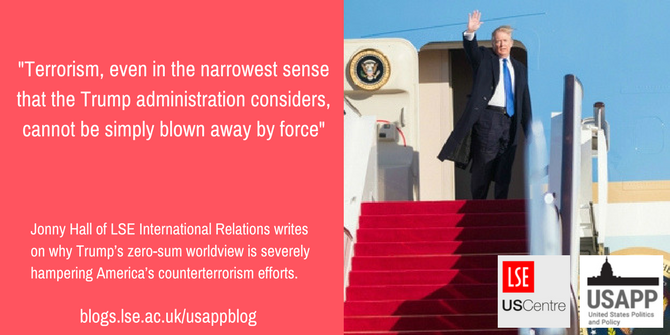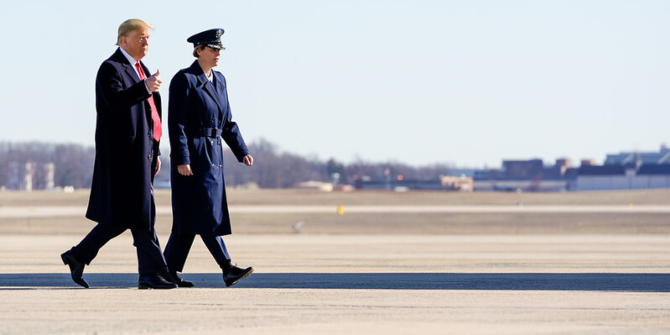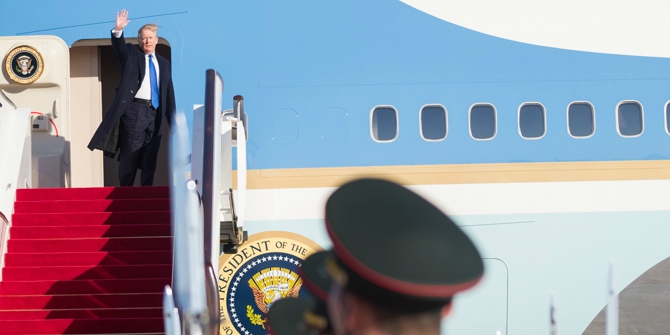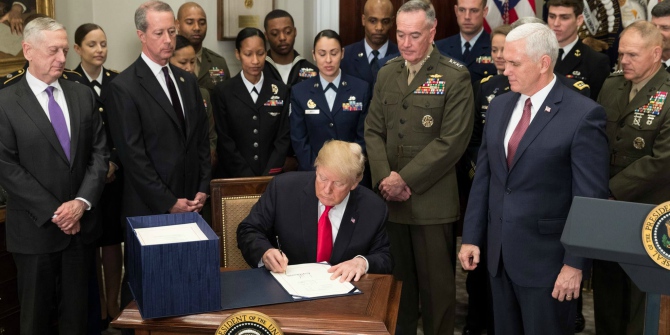 In his inaugural address in January, President Trump vowed to “eradicate completely… Radical Islamic Terrorism”. Jonny Hall writes that while Trump’s rhetoric against terrorism is not an enormous change from that of the Bush or Obama administration, what is very different is how Trump’s perspective informs American counterterrorism policy. Trump’s zero-sum worldview, he argues, largely ignores the ’causes’ of terrorism, and instead seeks to apply brute force to end the problem, which in the long run may end up making it worse.
In his inaugural address in January, President Trump vowed to “eradicate completely… Radical Islamic Terrorism”. Jonny Hall writes that while Trump’s rhetoric against terrorism is not an enormous change from that of the Bush or Obama administration, what is very different is how Trump’s perspective informs American counterterrorism policy. Trump’s zero-sum worldview, he argues, largely ignores the ’causes’ of terrorism, and instead seeks to apply brute force to end the problem, which in the long run may end up making it worse.
What is Donald Trump’s foreign policy doctrine? Much has been written attempting to answer this question (here and here for example). By and large, such pieces have identified Trump’s worldview as narrowly transactional and zero-sum. One underexplored point seems to be the consequences of Trump’s worldview and America’s counterterrorism policies. To be sure, America’s post-9/11 presidents have remained committed to uncompromising counterterrorism policies, but not because of how they view the world around them.
While counterterrorism is an area of relative foreign policy continuity between Trump’s and Barack Obama’s presidencies (Trump’s “secret plan” to defeat ISIS stands out), we should not be blind to changes that have already occurred. Uri Friedman recently argued that the most ‘dangerous’ element of Trump’s foreign policy is not where he obviously deviates from previous presidents, but in his continuation and escalation of conflicts he inherited. More broadly, the American military appears to be growing its counterterrorism force in Africa as well as creating a more permanent presence in Syria.
In itself, this cannot be a foreign policy phenomenon associated solely with Trump; the point instead is that his zero-sum view is just yet another reason as to why America’s counterterrorist operations are likely to expand. It is easy to label Trump’s promise in his inaugural address to “eradicate completely” what he terms “Radical Islamic Terrorism” “from the face of the Earth” as mere rhetoric, but it would not be surprising if Trump actually believed that he could possibly achieve such a thing. Terrorism, in Trump’s view, is something to simply “defeat”, “drive … out of our nations” and “extinguish … from our planet”.
These quotes are hardly an aberration from the original “War on Terror” rhetoric; George W. Bush spoke of how the conflict would “not end until every terrorist group of global reach” had been “defeated” in his infamous address to Congress in September 2001. Whilst Obama generally spoke of America’s counterterrorist efforts in narrower terms, in March 2016 he stated that the world’s governments “can – and will – defeat those who threaten the safety and security of people all around the world.” The crucial contrast with Trump is that both these presidents (to varying extents) saw the complex causes of political violence, with Bush recognising the security element of his developmental policies and Obama identifying what he believed to be the underlying conditions that increased the likelihood of terrorism, as well as some initial attempts at addressing these.

“President Trump’s Trip to Asia” by The White House is Public Domain
Trump’s worldview allows for no such nuance. In March, Mick Mulvaney, Director of the Office of Management and Budget, presented a budget that he saw as a deliberate deviation from previous administrations; a “hard power budget”. There are demons to be defeated and walls to be built, so the Trumpian logic goes. And to an extent, some of the unique moves of the Obama administration’s counterterrorist campaign – especially its geographical distancing and light-footprint model – are particularly well-suited to the kind of aloof militarism that Trump’s foreign policy appears to espouse. Rarely a day goes by when Politico’s Morning Defence email newsletter doesn’t mention another lethal strike as a result of American counterterrorist efforts around the world, but this is hardly ‘news’.
The “adults in the room” might well hold well-crafted and nuanced worldviews, but they are almost by definition militarised ones. Plus, they can do little about the reduction in funding for “soft power” in the administration’s budget. A recent report from Brown University’s Watson Institute for International & Public Affairs estimated that the United States has spent $4.3 trillion in current dollars since 9/11 on counterterrorism; this spending isn’t going to slow down anytime soon. It would seem that for (at least) the next three years Trump’s zero-sum worldview is an important reason why America’s counterterrorism activities will continue.
Simultaneously, Trump’s zero-sum worldview also greatly hampers the long-term effectiveness of these operations. Terrorism, even in the narrowest sense that the Trump administration considers, cannot be simply blown away by force. As writers such as Louise Richardson and Martha Crenshaw have shown there is no single and identifiable ‘cause’ of terrorism – it is an inherently complex phenomenon with both deep and locally driven roots. Consequently, short-term and coercive actions must be supported by longer-term strategies, even if they do not seem directly relevant to the terrorist group in question.
The territorial defeat of Islamic State (IS) in Iraq and Syria seems a good case in point. First, it is unlikely to mean the end of the kind of terrorist attacks in Western states that Trump seems to particularly care about. Second, many national security writers have already identified areas where IS appears to be reorienting: the Philippines, Egypt, Somalia, to name but a few. And even where military success occurs, growing civilian casualties can only exaggerate any potential blowback effects for the United States. All this is without mentioning other organisations such as al-Qaeda and al-Shabaab. While we should not exaggerate the threat of terrorism to America as national security discourses since 2001 have tended to do, we do need to remember that terrorism is a complex and a wide-ranging problem.
The fundamental paradox is that Trump’s worldview, even less so than Bush’s, does not allow for this complexity. Terrorism, as a (largely) political phenomenon is not merely a site for military conflict, but also a battle for hearts and minds – it requires terrorist groups to ‘win’ in part by addressing the long-term causes of political violence. Trump’s obsession with ‘winning’ (and militarily in particular) is inherently at odds with this reality. As the saying goes, if you only have a hammer, you treat everything like a nail. Unfortunately political violence is no nail.
Please read our comments policy before commenting
Note: This article gives the views of the author, and not the position of USApp– American Politics and Policy, nor of the London School of Economics.
Shortened URL for this post: http://bit.ly/2y7Y51l
______________________
About the author
 Jonny Hall – LSE International Relations
Jonny Hall – LSE International Relations
Jonny Hall is a PhD Candidate in International Relations at the LSE. His research interests lie in American foreign policy, specifically counterterrorism Discourse in the Donald Trump era and the value of presidential rhetoric in this area in historical comparison.






